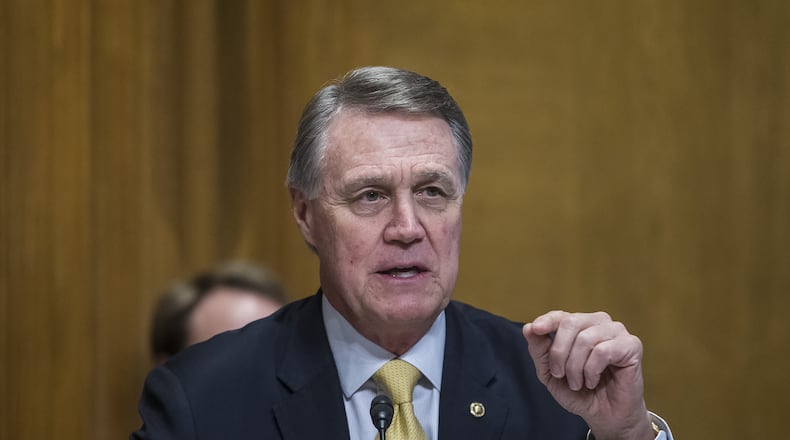Georgia U.S. Sen. David Perdue on Wednesday renewed his push for Congress to overhaul its government funding process, introducing a bill he hopes will be the first step toward tackling Social Security, Medicare and other growing parts of the federal budget.
The first-term Republican unveiled a bill that would make major changes to the way Capitol Hill funds federal agencies each year by establishing a series of tough consequences should lawmakers fail to complete their work on time.
It would block Congress from adjourning if funding milestones are not met and eventually dock the pay of lawmakers, staffers and officials at the White House budget office if both chambers don’t pass all 12 annual spending bills by Dec. 31.
The Fix Funding First Act largely overlaps with a proposal Perdue floated in 2016 that did not gain traction in the GOP-controlled Senate.
Since then, Perdue has experienced three government shutdowns and the collapse of a committee tasked with overhauling the budget process due to deep-seated partisan mistrust. He said he's approaching the issue with more "realistic" expectations this time around.
"I'd like to see this become law. I'm realistic,” the Senate Budget Committee member told reporters about the new legislation. “But this will start a dialogue.”
Perdue’s goal is relatively modest: making nonpartisan changes to Washington’s 45-year-old budget process that will help Congress parcel out its roughly $1.3 trillion discretionary budget on time each year.
It's part of a broader three-part plan for lawmakers to eventually address the roughly $2.7 trillion the federal government spends each year on entitlements such as Medicare and Social Security. The programs have rapidly expanded in recent years due to rising health care costs and the country's aging population, and portions are expected to begin running out of money in 2026 and 2035, respectively.
"We take it for granted that the world is going to keep loaning money and that our own citizens … are going to continue to buy our bonds,” Perdue said. “The good faith and credit of the U.S. federal government is at stake here.”
The proposal faces an uphill climb on Capitol Hill. Not only are lawmakers resistant to cutting their own pay, they've had difficulty advancing legislation that is even broadly bipartisan - a widely-supported $19 billion disaster relief bill took more than six months for Congress to pass. And many consider major changes to entitlement spending to be a political third rail, especially ahead of a major election.
A former corporate executive, Perdue has expressed deep frustration with Washington’s reliance on stopgap measures to fund the government. In speeches and media appearances, he frequently discusses the country’s expanding debt and how he thinks that’s contributed to a national defense “crisis.”
Perdue's critics have said his rhetoric is different from his voting record, pointing to his votes in favor of his party's $1.5 trillion tax overhaul, $320 billion budget deal and other large government spending bills that have added to the deficit.
Former Columbus Mayor Teresa Tomlinson, a Democrat challenging Perdue in 2020, recently called the Republican an "utter failure" for backing the tax bill and said he broke his campaign promise to overhaul the federal budget.
"If (Perdue) is reforming the budget, he's running in the wrong direction," Tomlinson said at a recent campaign stop in Evans, referring to the record-high trade deficit and national debt.
Perdue acknowledged his newest budget overhaul included some “draconian” consequences, but he said there was “no question” it would work.
“It will be painful to a lot of people who are in elected office, and that's why I'm very skeptical that it'll ever become law. But sooner or later, we'll have a crisis…. And then that'll force us, I believe, to change this whole process,” he said.
About the Author
Keep Reading
The Latest
Featured




